Time for a yarn
Samantha Dalton graduated from Macquarie University with a Master of Indigenous Education in 2020 and has been working remote for over 13 years. Not the working-from-home kind of remote, though. Really remote. She’s swapped teaching on Sydney’s lush Northern Beaches for the red dirt of outback Western Australia, where the roads can close for six months at a time, the local supermarket has been up to nine hours away and, right now, a big metal box from the Royal Flying Doctor Service makes her the local doctor as well – but there’s nowhere else she’d rather be.

Every morning, Samantha Dalton meets her students at the school gate. There are only 23 children from kindy to year 11 at Yulga Jinna Remote Community School, but this small gesture speaks volumes about Ms Dalton, her care for her students and indeed this tiny self-managed Indigenous community that has embraced her.
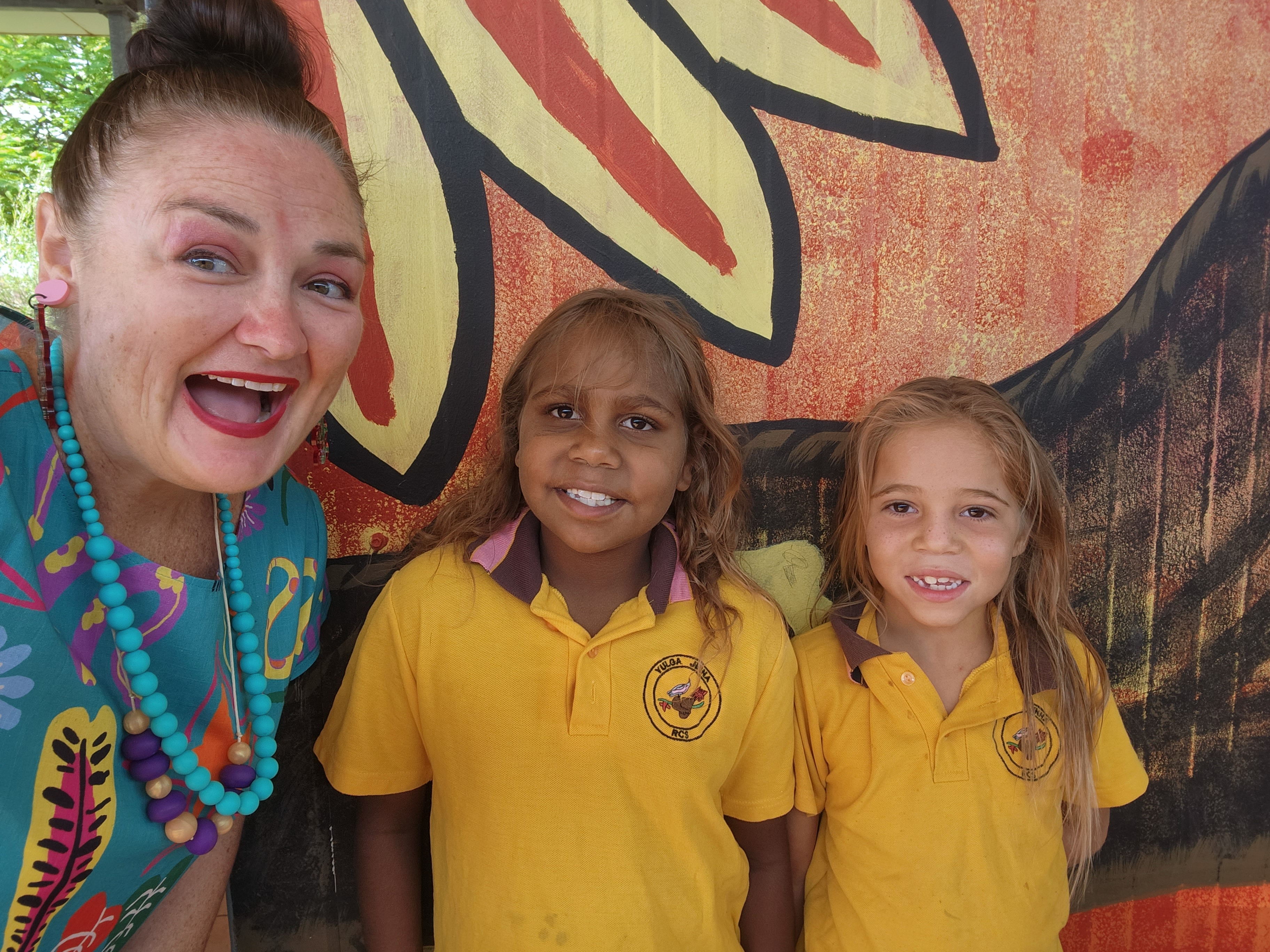
Nine to ten hours north of Perth by road, Yulga Jinna is on Wadjarri Country. There’s only the school and a dozen or so homes dotted around a red dirt loop, so Ms Dalton can easily see the students coming in their bright yellow-gold t-shirts. ‘Barndi mungal (good morning)!’ she cries, waving her hands then walking them into school. ‘I do it every time – it’s so important they come to school and that they’re welcomed.
‘I make sure I connect with each child every morning,’ she continues. ‘Did you have good sleep?’ she’ll ask. ‘What did you have for breakfast? Was that yummy?’ And as she recounts her morning, you can hear the warmth in her voice, her understanding of each and every child and their collective needs, as well as her deep respect for Indigenous peoples and culture.
‘Teaching at an Indigenous school is the most rewarding work I’ve ever done,’ she says. ‘I am part of this community, and this community is part of me. The parents and grandparents really value education, and it’s both inspiring and motivating to work with these leaders in the community – we all work really well together to be the very best we can be for the children at our school.’
And that’s what it’s all about for Ms Dalton. ‘Some people are drawn to the Kimberley for the money or the adventure. But it’s not about that,’ she says. ‘It’s not about you. It’s about quality education, and I’m passionate about that. And I’m passionate about being there for these kids – the regular rhythm of school, the dependability of the classroom, and a familiar face is vital for them.
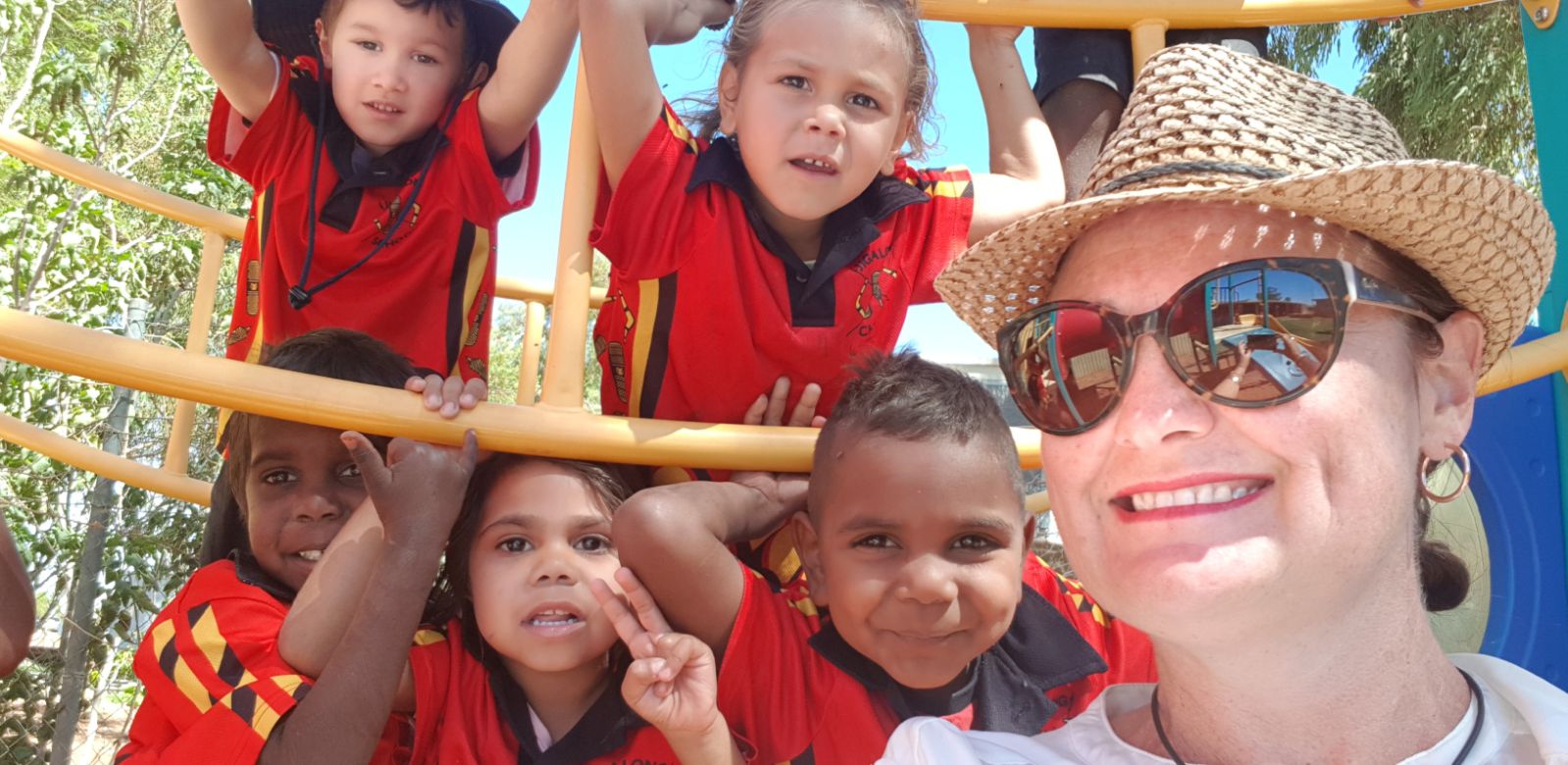
‘We also have high expectations,’ she says, referring to herself, the other teacher and an Aboriginal Islander Education Officer, who is her link with the families. ‘The kids thrive when they know what to expect, but it’s also about listening to the community and having a good relationship with families. And for me, it’s about making school fun, making it somewhere they want to come.’
Of course, swimming lessons an hour and a half away at the end of the week is a big drawcard for the students, but you get the feeling the kids are just drawn to Ms Dalton. And, although she was only appointed principal in January, she says she could easily – and happily – be there for the next 20 years. ‘The last principal was here for 11 years, so I have big shoes to fill, but I’ve got the most beautiful school. For my first job as a principal, I couldn’t have asked for better kids, better staff, a better community. I love it.’
Yulga Jinna is the fourth school Ms Dalton has taught at since she first left Sydney for outback Western Australia in 2011. She’d always been a passionate advocate for Indigenous education, but after a month-long trip to Darwin, she realised this was what she was meant to be doing.
‘I’d been yarning with people in the Northern Territory, meeting different Indigenous people, and learned a lot about myself as an educator,’ she remembers. ‘That’s when I realised that for me, being on this planet was much bigger than what I was doing at the time, and I decided to work with First Australians. I knew I wanted to make an impact.’
Fortuitously, not long after, a teacher recruitment poster with the headline Kimberley Calling caught her eye. ‘I just thought, I can go outback, I can do Country. I knew that’s what I needed to do, so applied and was successful, and just got on a plane to Broome.
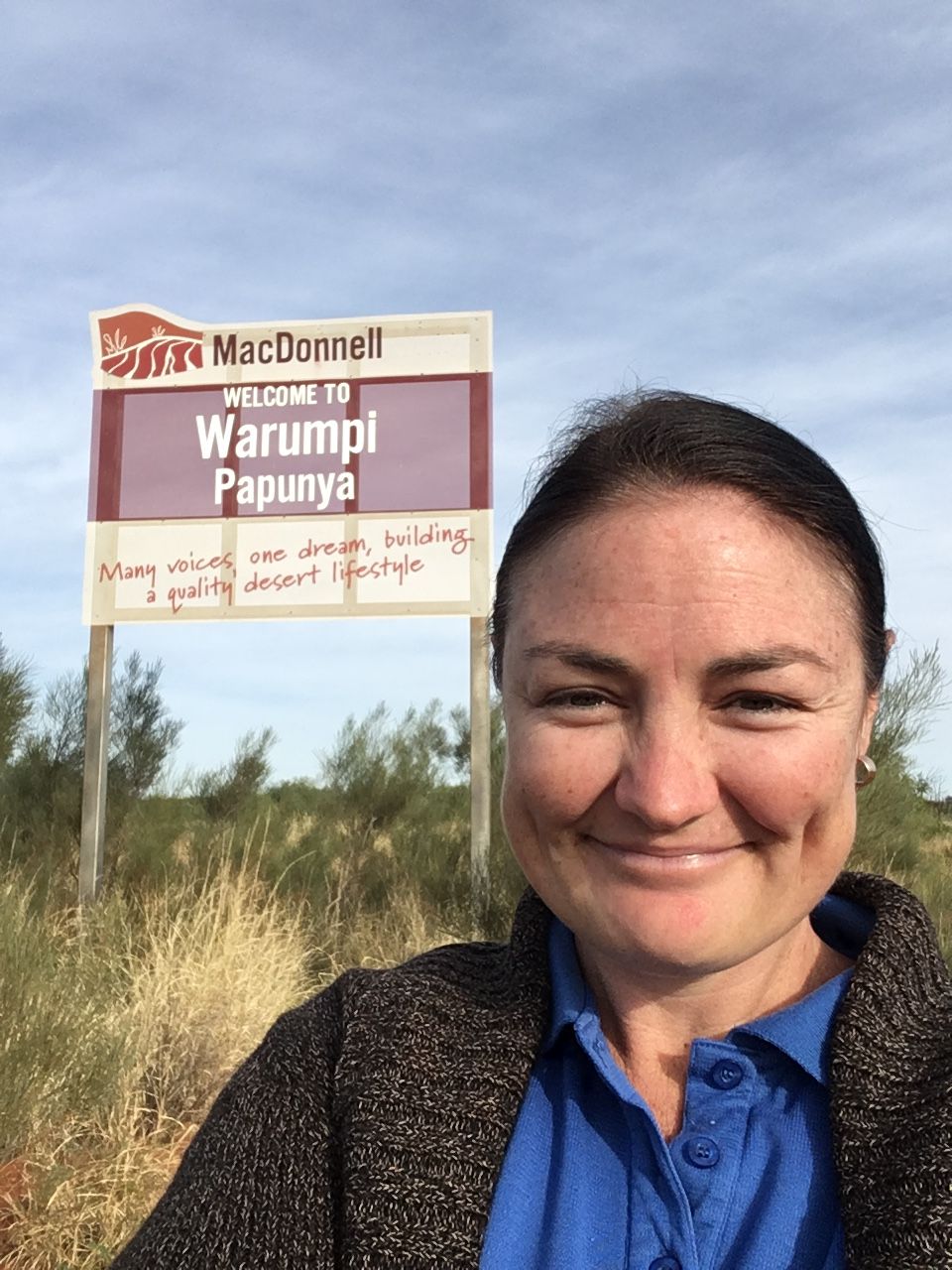
‘My first position was at Halls Creek, in the heart of the Kimberley. I’d never even been to Western Australia before, so it was a really big culture shock at first – I just couldn’t get used to the heat and the flies – but I fell in love. It’s so peaceful, and Country consistently amazed me. To my surprise, I loved camping and swimming in rock holes and just taking on a very different outback lifestyle. It has changed me, like it does everyone who comes here.’
After Halls Creek, Ms Dalton taught for eight years at Jigalong, in the Pilbara region, and then Kalumbaru, the most remote permanent settlement in Western Australia, for three years. ‘Every place I’ve been is just so different – every Aboriginal community, like my fingerprint, is just so, so different.’
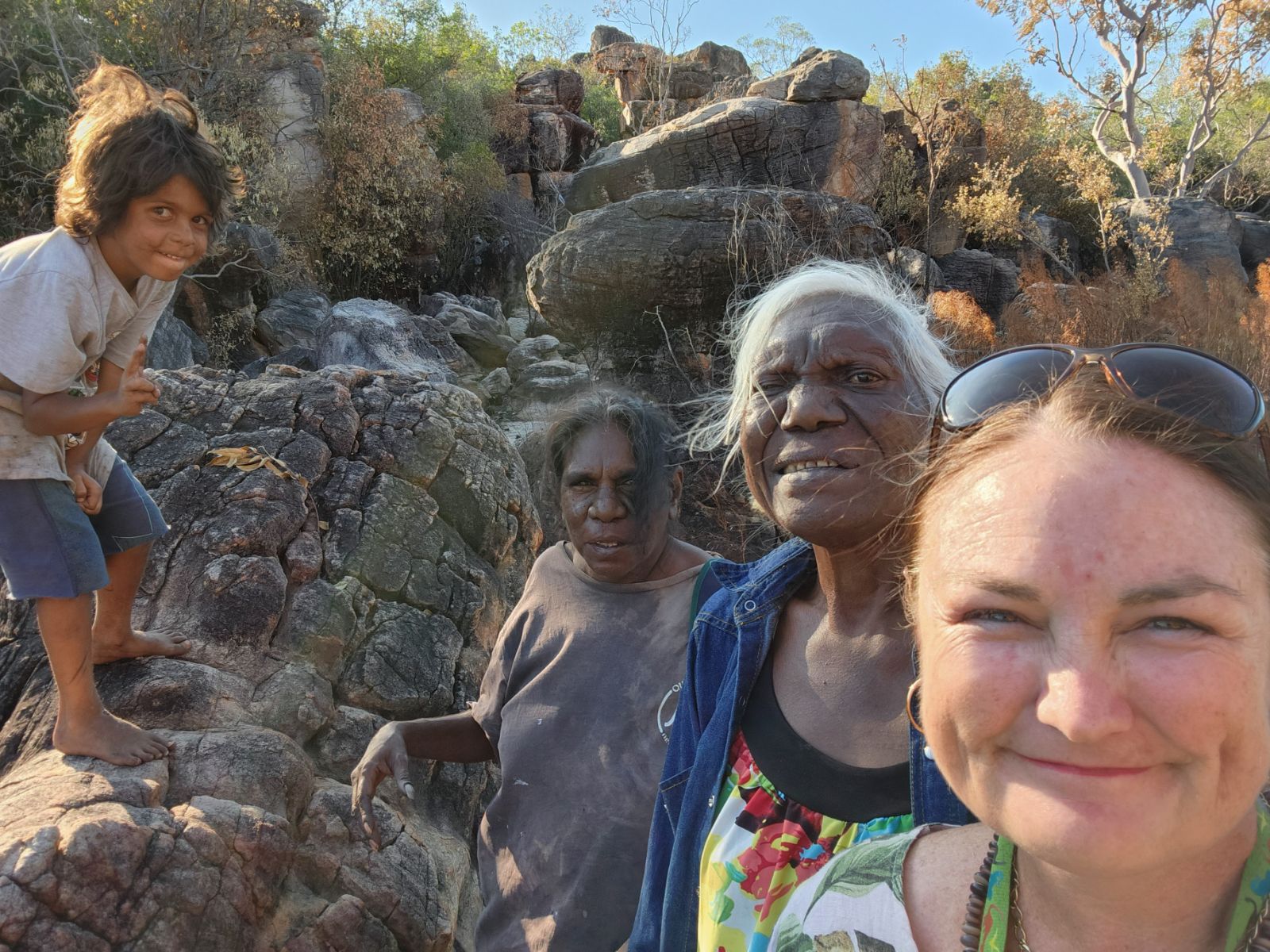
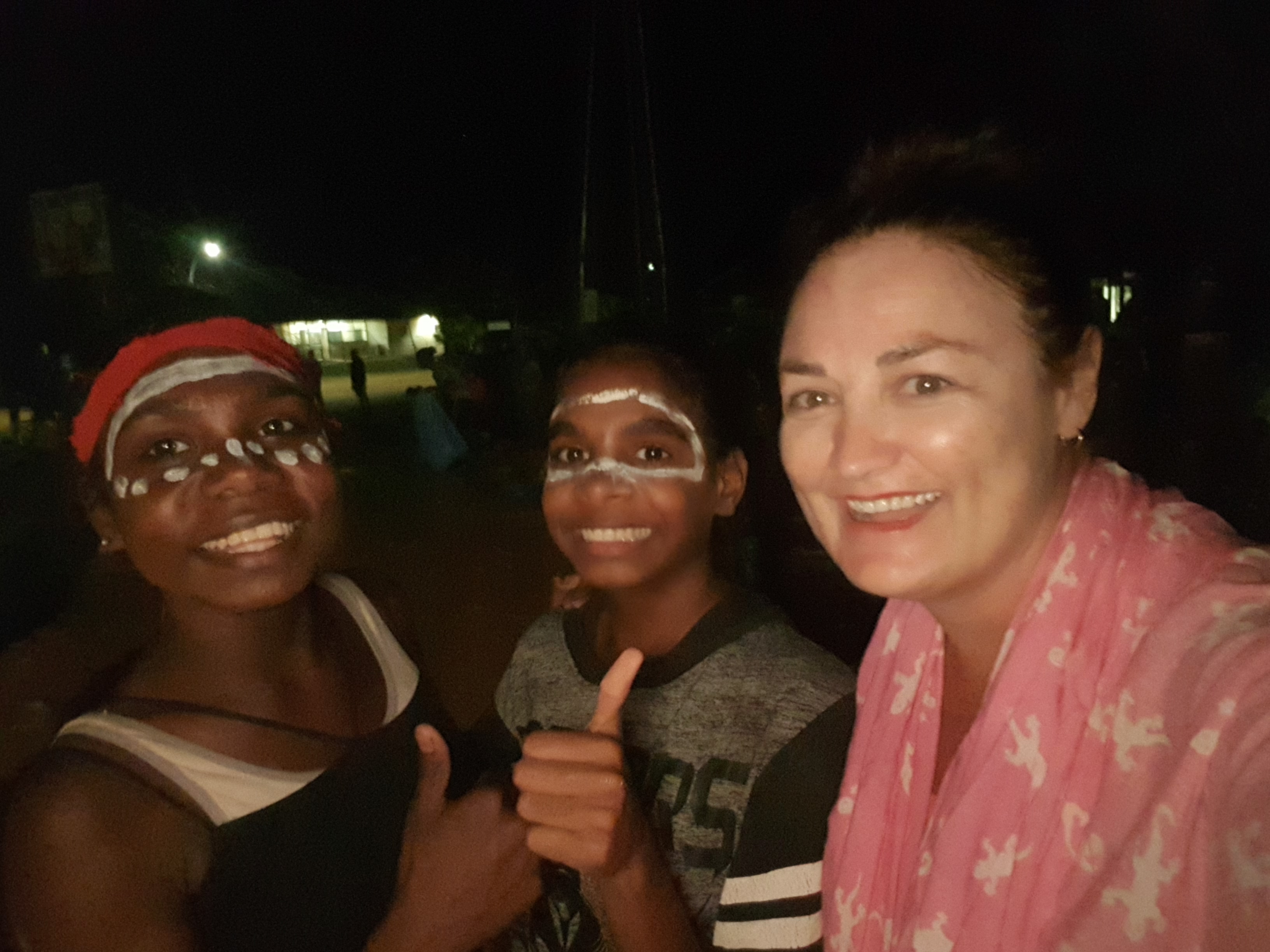
But there are some common threads – and not just the fact that everywhere she goes the first Aboriginal word she learns is for snake! Importantly, Ms Dalton emphasises the need to keep kids on Country, and connected to Country. That’s why some days, class goes outside, under the big tree, to yarn. And when the community asks to spend the day on Country, ‘We just go,’ says Ms Dalton matter of factly. ‘We drop everything – our kids don’t need a desk to learn.’
It’s also why she’s so pleased she has six high school kids on the roll this year, who would usually go to boarding school in Perth or Geraldton. ‘The kids miss out on a lot if they’re only coming back for the school holidays – when they’re not in community, they miss out on language, they miss out on festivals, there are lots of seasonal things they miss out on.’
Still, it takes a particular skillset to understand the complexities that hum beneath the surface in the classroom out here, and that’s why Ms Dalton was drawn to the Master of Indigenous Education at Macquarie University. ‘Teaching remote Indigenous children is very different to teaching non-Indigenous children,’ she explains.
‘I wanted to improve my practice, my teaching, and the master’s exceeded my expectations – it has helped me be the best teacher I can be to my Indigenous students. Living in an Indigenous community while studying, the lecturers appreciated my insight and I found my tribe – I felt valued as a student, and the support I received during my degree was paramount.’
She also became good friends with the lecturers, especially Professor Bronwyn Carlson, who she says cheered her success the loudest. ‘She was inspiring and motivating, and as soon as I met her, I started enjoying my degree – that’s a very hard thing to achieve when studying online.’
Still, Ms Dalton’s cousin Benny is a Macquarie alumni and her mum Kerry, who was also a teacher, had studied at Macquarie when Ms Dalton was little, so she was already familiar with the university. ‘I was so proud to tell my mum I’d been accepted into her alma mater, and was thrilled to relive some memories on campus with my cousin Benny when I visited for my face-to-face sessions.’
All in all, Ms Dalton was in her element at Macquarie, and it allowed her to explore issues close to her heart and build on her experience. ‘I remember one paper I wrote for my master’s was about Aboriginal kids leaving remote and very remote communities to go to boarding schools. A lot of them are faith-based, and I was exploring how that fits in with Aboriginal spirituality. This is the stuff I absolutely love; I’m thinking about this sort of thing all the time – my big passion is Aboriginal spirituality and connection to Country.
‘As non-Indigenous people, we know very little about Aboriginal culture – I didn’t know just how little I knew until I started living and working and breathing it. That’s why it’s so important to educate Australians living in cities – they need to know how incredibly special the Aboriginal culture is, how incredibly precious. And we, all Australians, should be doing absolutely everything in our power to improve the educational outcomes of Aboriginal children.’

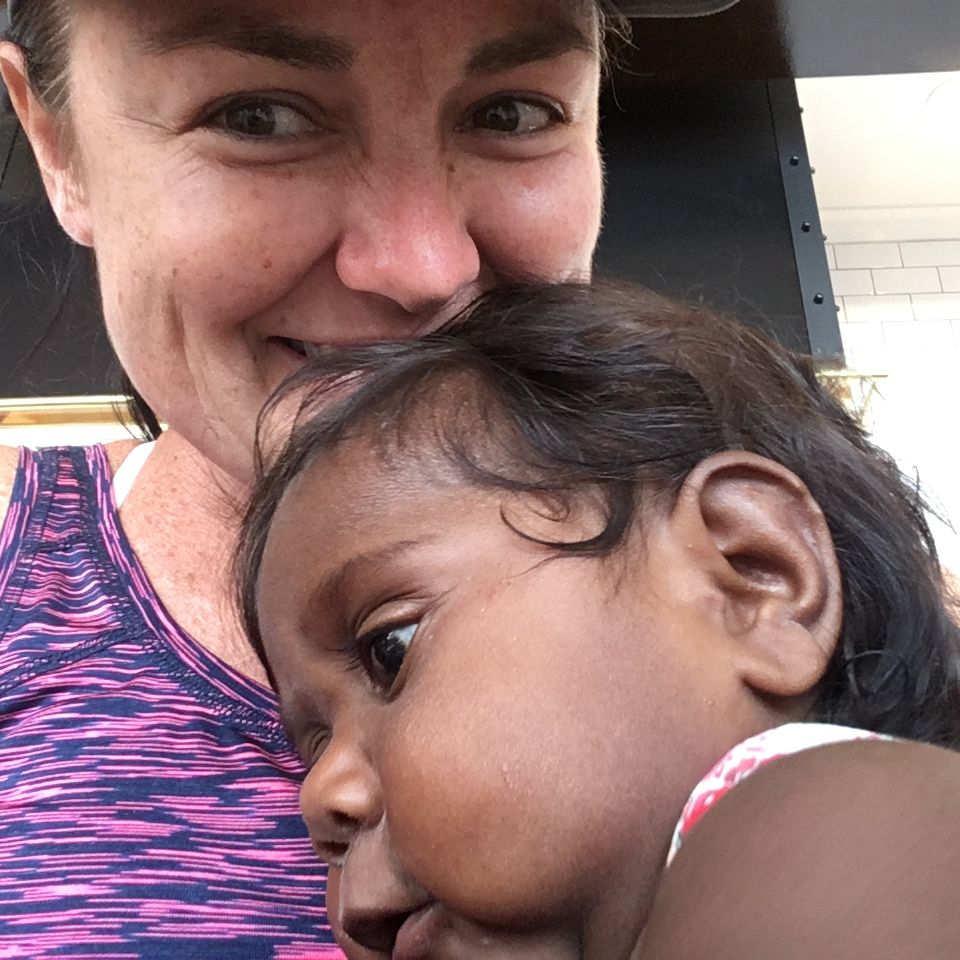
There’s a sincerity to her passion, and a genuine desire for others to experience what she knows so well. ‘I would love to see all student teachers do some prac work in remote, regional or rural areas. Queensland used to do that,’ she says. ‘You had to go out for two years before you could get a position at a school in Brisbane or the Gold Coast, and it gave everyone a bit more experience and knowledge.
‘I’ve seen student praccies – teachers, vets, chiropractors, speech therapists and OTs – come out here, and you know what? They’re better people at the end of their prac. They’re more sympathetic to Aboriginal needs, and more open-minded to how diverse patients and clients can be. And they’re just better listeners.
‘I’d like to see more teachers who are truly passionate about Aboriginal education work in remote and regional areas because these kids, they change everything, they get into your heart. All children do, but there are some really special moments you only get working in remote. And if you’re not exposed to it, you’re not going to know – that would have been the case for me if I hadn’t taken a leap of faith.’
Still, there’s a lot of work yet to be done at Yulga Jinna. With her big heart, Ms Dalton is establishing a playgroup for kids aged zero to three, and she’s also encouraging one of her teachers to become a qualified Cultural Teacher, and her students to find work on Country. ‘I’ve got one girl in year 11 right now, and she’s doing a Certificate II in Ecosystems and Land Management, and she’s also doing a Certificate II in Children, Families and Communities. So, like most kids here, her two job opportunities are to be a ranger or a teacher. I love that.’
There’s also the work of making sure, thanks to the support of Foodbank, that the children continue to receive a healthy recess and next term lunch as well, and coordinating books for the school’s library programs through the Indigenous Literacy Foundation. And, she’s organising a school camp – the first for Yulga Jinna Remote Community School since 2018.
‘I want to take the kids to Rotto,’ she says excitedly, referring to Rottnest Island, off Perth. ‘Usually, as a teacher, it’s all about spending the money, but out here, we’ve got to find the money to go, and we’re really conscious that families are saving all their money for the camp.’
You can hear the determination in her voice to make the camp happen, and do it right. ‘I’ll contact the Noongars to do a Welcome to Country and the smoking ceremony,’ she bubbles along. ‘We’ll do that everywhere we go, and we’ll have a Culture Teacher with us too; that’s really important.’
Indeed, it’s all important to Ms Dalton. And, no doubt, when she sets out for Perth, the kids bumping along the dusty red road on their first-ever camp, the reception going in and out, there will be community waving her off. ‘Miss, are you going one way?’ someone will say. And she’ll reply reassuringly, ‘No, I’m going two ways, I’m coming back.’

Samantha Dalton graduated from Macquarie University with a Master of Indigenous Education in 2020, and is currently Principal at Yulga Jinna Remote Community School in the Murchison Mid-West Region of Western Australia, 130 kilometres northwest of Meekatharra.
She taught at Halls Creek from 2011 to 2012 and at Jigalong from 2013 to 2019, then Kalumburu, the most northerly Aboriginal community in Western Australia, from 2020 to 2023, and has also taught at schools in Sydney.
Ms Dalton also holds a Bachelor of Education Primary (2010) from the University of Sydney and a Graduate Diploma of Science (2020) from Murdoch University.